Equipe Sport’s founding family carries on a storied legacy of industrial entrepreneurship through their successful sporting goods business
STORY BY BENJAMIN LERNER
PHOTOGRAPHY COURTESY EQUIPE SPORT & MUSEUM OF INNOVATION AND SCIENCE
As Parker Rice sits with his father, Wilbur, in a well-lit conference room above the main floor of Equipe Sport’s original Rawsonville store, his diction is powerful and precise as he speaks on the day-to-day operations of the business. “A retail business should run like a well-oiled machine,” says Parker. “If you take the time to hire the right people, train them correctly, and maintain consistent standards of customer service, your hard work will likely be reflected through positive results.”
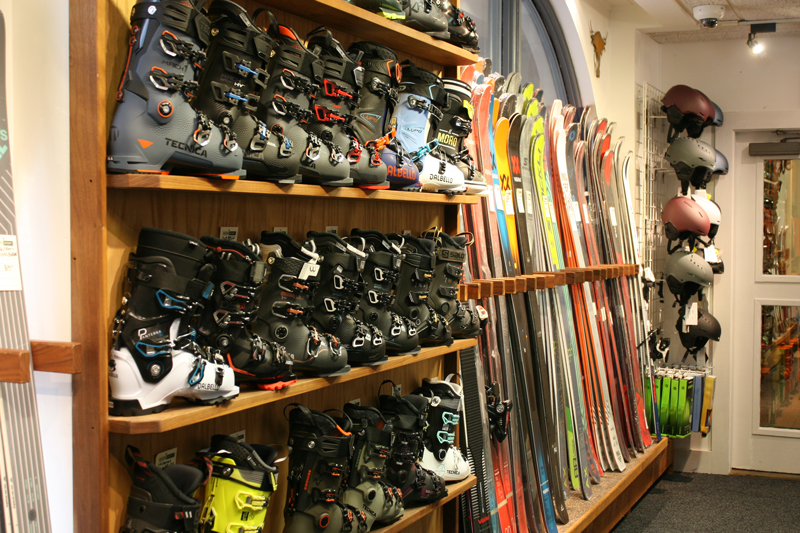
Parker is by no means a mechanical engineer, but his stores still run like clockwork. In the Rawsonville location, neat and orderly racks of systematically-organized name-brand outdoor apparel pieces stand in a clean and open room, and the walls are replete with perfectly-placed specialty hiking shoes, boots, and skis. Although Equipe Sport certainly has an inviting and casual ambience, their well-mannered and knowledgeable employees move with disciplined efficiency as they pace the floors. Wilbur and Parker might not have followed the same path as their famed ancestor Edwin W. Rice, Jr. (who served as the second President of General Electric) but they nevertheless possess the same passion for entrepreneurial excellence. As Parker carries Equipe Sport forward into the future with his wife, Karen, they remain grounded and focused in their pursuit of retail excellence. Channeling the same spirit of enthusiastic diligence that once propelled Parker’s Great-great-grandfather, Edwin, to the highest levels of industrial success, they go above and beyond to make sure every customer is able to enjoy a positive retail experience.
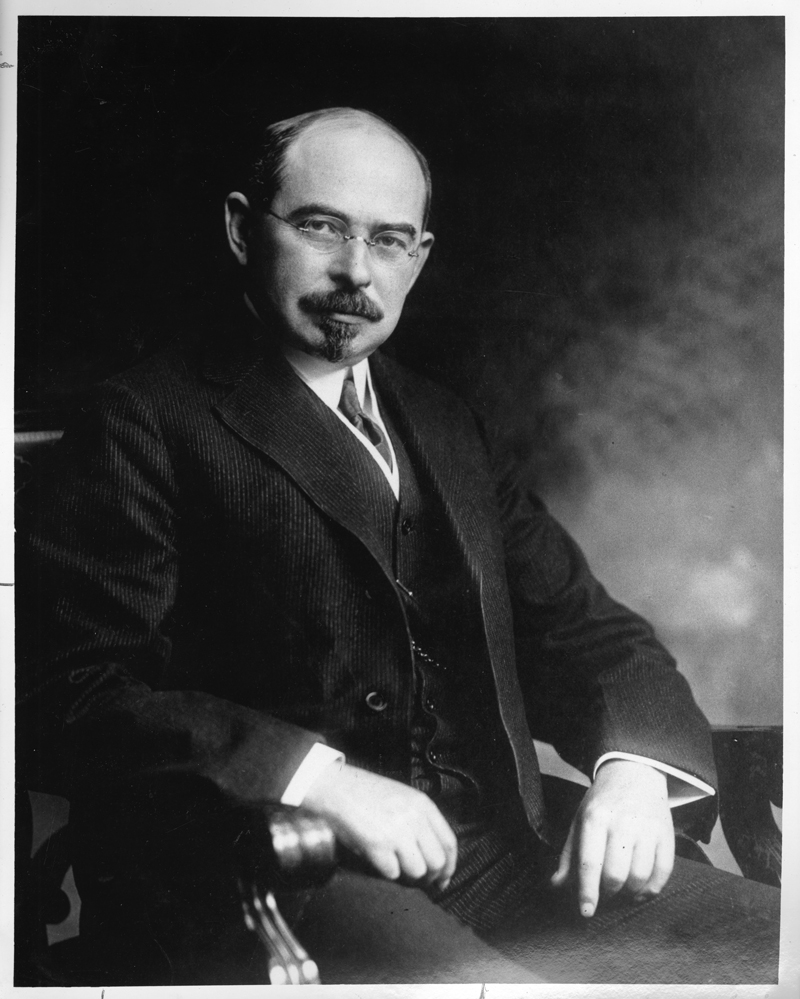
Family History
Over a century before Wilbur Rice first opened Equipe Sport in Rawsonville, his Great-grandfather, Edwin W. Rice, Jr., was born in La Crosse, Wisconsin in May 1862. Edwin spent the majority of his childhood in Philadelphia, where he first crossed paths with Professor Elihu Thomson at Boys’ Central High School in 1876. Thomson noticed Edwin’s budding interest in mechanical science and encouraged him to pursue his emergent passion. After making the decision to leave the academic field to pursue a career in electrical engineering, Thomson offered Edwin a job as his assistant in 1880. Edwin accepted the offer and moved from Philadelphia to New Britain, Connecticut to work for Thomson at the American Electric Company. While there, he learned the fundamental science behind electrical mechanics, and also learned how to manufacture early electrical devices, such as arc lamps and dynamos.
After the American Electrical Company was purchased by a group of investors focused on electrical infrastructure, the company was moved to Lynn, Massachusetts in 1883 and renamed Thomson-Houston Electric Company. After the company moved to Massachusetts, Edwin was promoted to the role of plant superintendent in 1885. When Thomson-Houston Electric Company merged with Edison General Electric in 1892 to form the General Electric Company, Edwin became the Technical Director. Over the next two decades, Edwin rose through the ranks from Vice President of Manufacturing to Senior Vice President. He was then eventually promoted to President of General Electric after succeeding the company’s first president, Charles A. Coffin. After nine years of faithful service, Edwin stepped down from his position and served the remainder of his time at General Electric as Chairman of the Board.
Over the course of his tenure at General Electric, Edwin developed close friendships with celebrated electrical impresarios and brilliant scientists such as Thomas Edison and Charles Proteus Steinmetz. He also contributed to the collective success of the company in a number of ways. Edwin improved the factory’s efficiency through well-planned corporate organization, consulted with engineering staff, and oversaw every stage of engineering and technical development. At the end of his fruitful career, Edwin held over 100 patents, which included designs for synchronous converters, incandescent lamps, radio sonar detectors, high-capacity oil switches, direct and alternating current motors, train control systems, and transformers, among others. In 1917, Edwin was made an honorary member of the prestigious Order of the Rising Sun by the Japanese emperor Yoshihito. Edwin was one of few westerners ever awarded with the prestigious designation, which he received in recognition of the work that he had done to aid in the development of electrical technology infrastructure in Japan. Edwin passed away in 1935, survived by his three children.
One of his children, Chester Williams Rice, grew up to be a similarly-influential electrical engineer. Born in Lynn, Massachusetts in December 1888, Chester spent his high school years at The Albany Academy. He went on to study at Harvard, where he earned a bachelor’s degree in science and a master’s degree in engineering. After graduating, Chester followed in his father’s footsteps and pursued a career in electrical engineering at General Electric. While there, he worked in their electrical engineering lab as a scientist and inventor. Through his partnership with another skilled and passionate electrical engineer by the name of Edward W. Kellogg, he created the prototype for the first electric magnetic resonating loudspeaker in 1921. The technology was then patented several years later in 1925 and was used in General Electric’s popular line of Radiola loudspeakers. Until then, the most powerful electrical speakers had all been derived from Edison’s original 1878 horn speaker model. While Edison’s design was certainly groundbreaking at the time of its conception, it was very limited in terms of its ability to project sound over long distances. Chester Rice and Edward Kellogg’s invention made it possible to broadcast sound to large audiences, which had broad implications in the entertainment industry. Their technology was first used in movie theaters and aided in the development of the motion picture industry at a time when it was transitioning out of the era of silent film. Today, electromagnetic resonance technology is used in all forms of speakers, from car radio speakers to stadium loudspeakers.
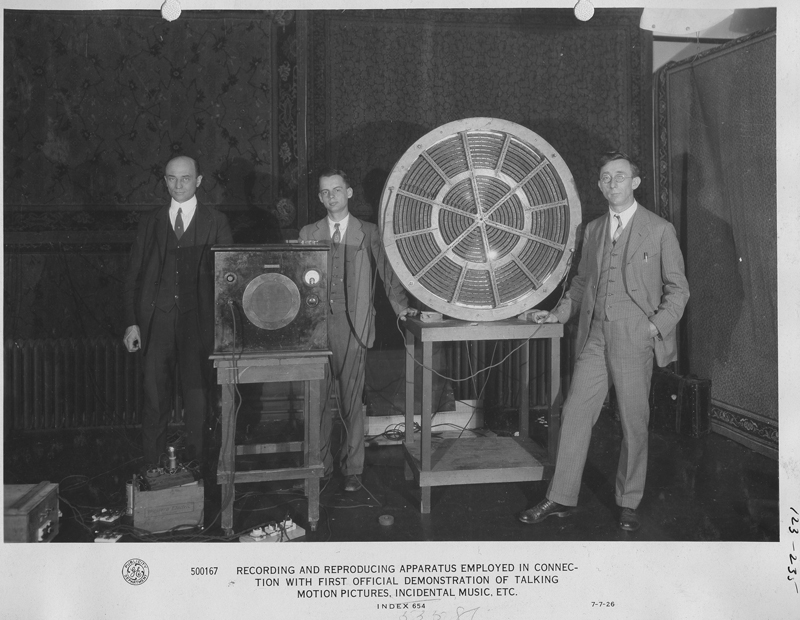
Chester’s passion for mechanics was later carried forth by his son, Wilbur C. Rice, who was born in 1916 in Schenectady, NY. Wilbur C. spent his life working in the field of industrial manufacturing. In the early years of his industrial career, he ran the Eddy Plow Works foundry factory in East Greenwich, which manufactured simple non-electric farming tools such as harrows, discs and plows. When the Eddy Plow Works factory burned down in 1953, Wilbur C. moved to Bennington with his wife and children (including his son Wilbur Rice, who was born 4 years earlier in 1948). Following his relocation to Vermont, Wilbur C. worked at the Warren Wire factory in Pownal for ten years, manufacturing copper-coated wire. Afterwards, he bought a company called Flomatic in Hoosick Falls, New York, which specialized in bronze foot valves, gate valves, and plug valves.
Building the Business
While his father was working at Warren Wire and Flomatic, Wilbur Rice spent his childhood years in Bennington. Wilbur got his first job at a Bennington-based company working construction in the summers before his junior and senior year in high school. Following his graduation from Berkshire School in Sheffield, Massachusetts, Rice enrolled at the University of Vermont (UVM) in the fall of 1966, where he majored in political science. After his freshman year, he came back home in the summer of 1967, where he got a job at the construction site of a ski shop in Rawsonville that was owned by Southern Vermont ski entrepreneur Emory “Woody” Woodall. (Coincidentally, the very same building would end up housing Equipe Sport over two decades later.) Following the completion of the building, Wilbur was offered an opportunity to come back to the store to sell ski equipment on the weekends. A quick learner, Wilbur quickly rose through the ranks and built a reputation as a knowledgeable salesman. After attending UVM for two-and-a-half years, Wilbur Joined the U.S. Air Force. He served on active duty for six months and continued to serve for the following three-and-a-half years on a part-time basis.
After his four-year stint in the U.S. Air Force, Wilbur began working at the Bromley Mountain Ski Shop in September 1970, which he ran for two years. Wilbur then took a job at Salomon North America, and worked in their sales division for two years, selling high-quality ski bindings. In 1976, Wilbur returned to Bromley Mountain, where he oversaw the development of their mail order business, the Bromley Catalogue. In 1981, Bromley Mountain was bought out by Stratton, and Wilbur was transferred over to the Stratton office. While at Stratton, he ran their retail, rental, and repair operations. He also helped to build Stratton Village from 1983 to 1986. Although Wilbur possessed an inherent proclivity for mechanics (which was expressed through his extensive knowledge of ski binding technology), he found his true calling in business oversight and real estate management.
“The aim was to create a village environment that would make people want to stay at Stratton for longer,” says Wilbur. “In order to keep people on the hill after they’re done skiing for the day, you have to have shops and restaurants that add to the experience. First, we built the Village Lodge, then we built the building that currently houses Von Bargen’s and several others around it. An interesting fact about the construction process is that the architect who designed it was from Miami. The aesthetic that he brought to the mountain was a definite departure from Stratton’s early Tyrolean roots, but it brought it forward into the future.”
After the buildings were constructed, Wilbur spent the following several years working to bring businesses to Stratton Village. “In the beginning, the aim was to bring two high-end restaurants, a grocery store, and a coffee bar to Stratton. We were able to build a good mix of stores and restaurants in the beginning, and it’s continued to change and evolve to this day.” While Wilbur was building up Stratton’s Village and building up his business acumen, he purchased the building in Rawsonville that now houses Equipe Sport in 1984 from Stratton. At the time, it served as the home for Stratton’s ski shop. In 1989, Stratton closed their ski shop in Rawsonville, and Rice left his job at Stratton to pursue a new opportunity as a ski industry consultant. After six months of working in that field, he made the decision to open a ski shop at his Rawsonville property due to the fact that Stratton had ended their lease.
When Wilbur first opened Equipe Sport in 1989, it primarily served as a ski shop. Over the following years, additional “counter-seasonal” products were added, such as canoes, hiking boots, and outdoor apparel. In its earliest years, Wilbur applied the crucial lessons that he had learned during the years he had spent working to develop Stratton’s village to help grow Equipe Sport as a business. In 1991, Equipe Sport opened a second location in Stratton Village after a storefront in a prime location became available.
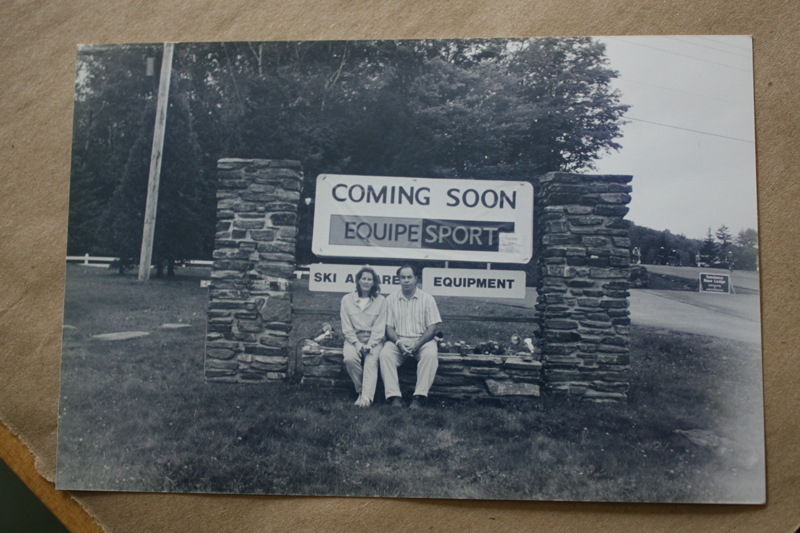
“My father knew that it was a smart idea to open a shop in the Village,” says Parker. “It’s a captive market. People could try a set of skis or boots out on the slopes and come back to make adjustments as needed.” Several years after Equipe Sport opened the Stratton shop, Wilbur knew that it was time to open a separate store that specialized entirely in snowboarding products. He opened Mountain Riders across the road from the original Rawsonville shop in 1994 to satisfy that market.
As Equipe Sport continued to blossom as a business, Parker’s mother, Sue Rice, also played a large part in its expansion. At the same time that she was working as a brand representative for Descente North America, Sue was also working part-time as the main buyer for Equipe Sport’s clothing and accessory departments. Eventually, it became clear that Sue could no longer do both. Sue then made the decision to leave Descente North America, and focused her attention on overseeing Equipe’s buying operation.
In 1996, Equipe Sport opened a third shop at Mount Snow Ski Resort in Dover. “Another ski shop had closed there, so it was a completely natural fit,” notes Parker “It was a great time to expand. The store there needed a lot of work after the transfer of ownership. The interior was completely redone to make it fresh and new, and the decision was made to offer ski and snowboard products in the same store. To this day, the Mount Snow location is the only shop that offers both product ranges in the same place. The Mount Snow location also has a wide inventory of kayaking and biking products, as well.”
While Equipe Sport was gaining traction and adding new storefronts to its business portfolio, Parker was growing up as a young child in Manchester, Vermont. Parker graduated from Berkshire School in 2002 and went on to attended Hobart College in Geneva, New York, where he majored in political science. Following his graduation from Hobart in 2006, Parker found a job at a commercial real estate firm in New York.
Although Parker says that he never intended to return to Vermont to take the helm of the family business, he was nevertheless happy to make the change. “At a time when I was just about to take a job at a different firm, my parents had decided to make some significant managerial staffing adjustments at Equipe Sport. At that point, I offered to take over one of the vacant positions. I came back in October 2007. When I first came back, I wasn’t running anything. I was just trying to learn the ropes as quickly as I could. I did a little bit of everything. I ran the ski rental operation at the Rawsonville location, and I also spent some time at the Stratton Village location. After I had spent some time acquainting myself with the business, I stepped up to the role of General Manager. Both of my parents – as well as the other managers in the store – helped a lot in the early days as I stepped into Equipe. It was a great experience. We’ve always had a really good work culture here at Equipe, and we also have incredibly loyal customers. You can run the best business in the world, but if you’re team’s not behind you, you’re not going to be able to move forward.”
In the Fall of 2009, Parker met his future wife Karen Rice (née Webster) when she came to Equipe for a job during the 2009/2010 winter season. Over the following years, they married and started a family together, and Karen ended up taking over the buying, merchandising, and inventory management aspects of the business. In 2014, the Rice family opened a gas station opposite from the Rawsonville storefront called Rawsonville Market. A year later in 2015, Parker and Karen purchased all four Equipe Sport stores from Wilbur and Sue. Wilbur still owns the Rawsonville Market, but Karen and Parker oversee its day-to-day operations.
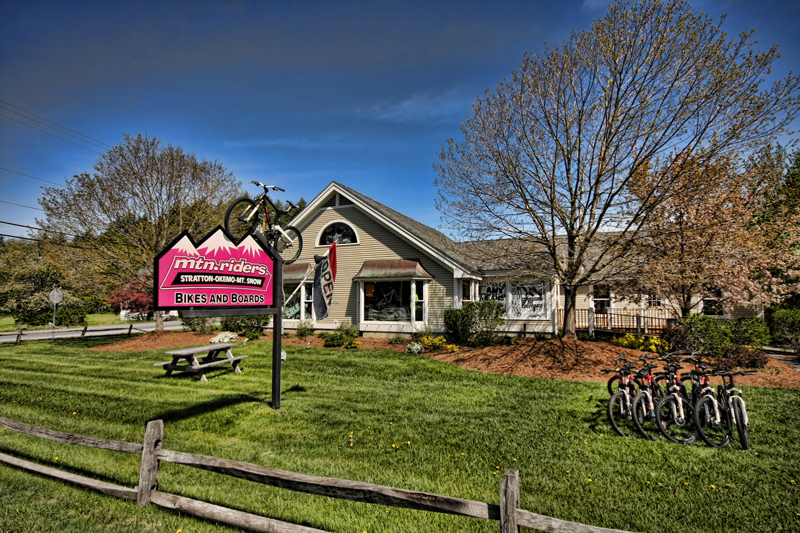
After purchasing the company, Parker and Karen continued to expand its wide range of product offerings. Today, Parrker and Karen work to maintain a wide range of product for many outdoor adventures. “Here at Equipe, we also sell a small number of local Vermont and New England-based brands, a large amount of European name-brand winter apparel, and American-made kayaks, among other things. We pride ourselves on sourcing the best products for our customers, and we’re also proud of our comprehensive employee training program.”
According to Parker, Equipe Sport closes all of their stores for two days each Fall to bring all of their employees (including returning staff members) for a training and networking event. “It’s a great way for people who work at our different stores to meet and connect with one another, and it’s also a great way to make sure that we’re all on the same page and doing things the same way in each store. Consistency is key in every business. Customer service standards need to be the same in every store to ensure a positive experience, especially in the ski industry.” According to Parker, the first experience that a skier has can easily determine whether or not they develop a lifelong love for the sport. “In order to make sure that happens, our sales associates have to be able to develop the knowledge necessary to ensure positive customer interactions. To that end, we bring in a lot of our vendors to give clinics about their products. We like to pick the ones that we know are going to provide the best education and keep it fun. It’s expensive to close down the stores for a few days while we hold the trainings, but I think that the team gets a lot out of it, which more than makes up for the lost revenue.”
As a lifelong Vermonter, Parker is passionately involved in several local community organizations, such as the Stratton Foundation. “I’ve been on the board of the Stratton Foundation for several years now as the treasurer. I’m incredibly grateful for the work that they’re doing through their philanthropic programs, and I want to help out in any way that I can.” Parker adds that he is also thankful to be able to live and work in Vermont for a number of reasons, including the quality of life and the educational system. “Southern Vermont is a great place to raise kids, and it’s also a wonderful place to own a business. People look out for each other here, and I want to make sure to uphold those types of honest community values that define Vermont’s culture with the way that I run my business.”
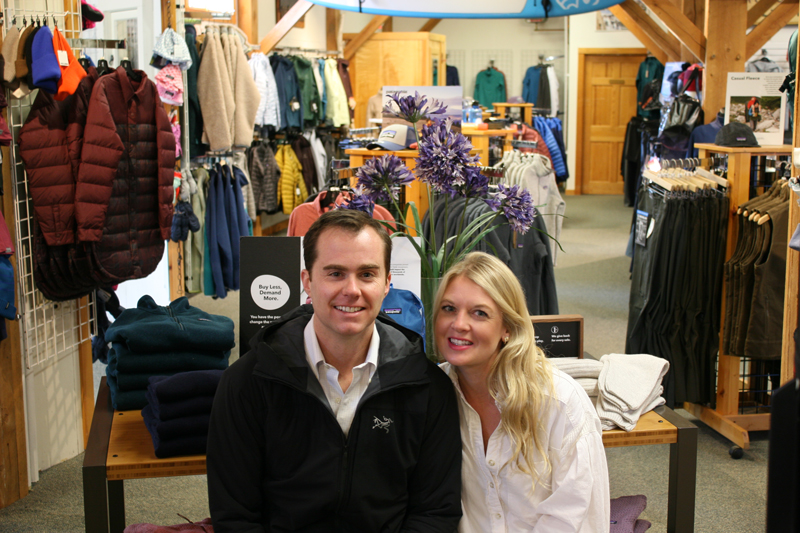
Building on that philosophy, Parker still goes out of his way to work several shifts a month at Equipe Sport’s rental counters. In the same way that his influential ancestors once found fulfillment through strolling the factory floors of their world-famous electrical companies, Parker finds a deep sense of joy in connecting with his customers and staff through face-to-face interaction at the stores that he and his wife own. “My favorite thing to do here at Equipe is working at the rental counter at the Stratton Store. I don’t necessarily need to do it as often as I do, but I really enjoy it. It allows me to make that crucial difference in a customer’s day. I spend most of my time staring at Excel spreadsheets and talking on the phone at my desk or driving between stores, but there’s nothing more rewarding than being able to solve a problem and make sure that a family has a great first skiing experience. If they enjoy their first day out on the slopes, they’ll come back to the store again and again. Our business is all about helping people make the most of their time outdoors, regardless of the season. I try to do whatever I can to make that happen.”
equipesport.com

